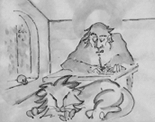
|
|||
| Volume 23, Number 1 | |||

|
|||
|

|
Y ou can use an ordinary dictionary to find extraordinary histories of words. This information is packed between the two brackets [ ] right before the definition of the entry word. (For an even richer experience, explore the venerable twenty-volume Oxford English Dictionary with its wealth of detail.)
L ook up the word window . You'll find that it comes from the Middle English (ME) windowe , which came from the Old Norse (ON) vindauga , which itself was formed from the two Old Norse words vindr , which meant "wind," and auga , which meant "eye." So window once meant "wind-eye," a poetic description appropriately suggesting a window's function of letting in both air and light. Find the history of other words. Look up words you've been curious about, or browse through the dictionary until a word catches your interest. Below are some words that Exploratorium staff members think have interesting histories.
book
|
poet
|
handsome
|
see
|
money
|
husband
|
||
|
|
|||
|
You can find additional explanations about the information in an entry in the front of your dictionary. Enjoy your discoveries!
|
|||
|
|
|||
|
Merriam-Webster
Dictionary: WWWebster Dictionary
|
|||
|
|
|
|
|
© Exploratorium |
